Recent Commercial Posts
Common Problems To Combat With Commercial Water Damage
11/1/2022 (Permalink)
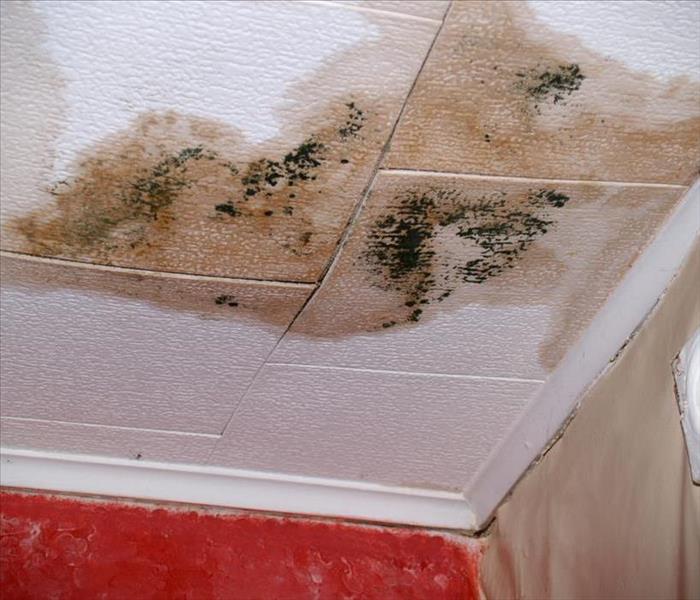 Your building is vulnerable to water damage in many areas.
Your building is vulnerable to water damage in many areas.
Commercial Water Damage
Commercial properties often face more costly water damage repairs because of the equipment on the property as well as the size and complexity of most commercial facilities. Whether you’re dealing with a broken pipe, storm damage or any other source of water issues, you should understand the importance of quick remediation. Here are the most common problems associated with commercial water damage in Bluffton, SC.
Structural Damage From Water Penetration
Whether excess water occurs from supply line breaks or broken pipes, the most common problem experienced from commercial water penetration is structural damage. Your building is vulnerable to water damage in many areas. The areas most commonly affected include:
- Drywall
- Roofing
- Flooring
- Foundation
The sooner you respond to a broken pipe, toilet overflow or any other source of water penetration, the less time water has to penetrate, reducing the structural damage effects.
Equipment Loss From Flooding Damage
One thing that sets commercial property water damage apart from residential damage is the equipment loss factor. Most businesses have capital equipment investments that are also susceptible to damage from water penetration.
Any water damage that your equipment suffers can lead to catastrophic failure. Some of this equipment may be difficult to replace if it is custom-designed for your business or in limited supply, which can affect ongoing operations.
Business Interruption From Water Damage
One water damage problem that many business owners overlook is business interruption. After a broken pipe, activated fire sprinklers or any other water disaster, you may have to close your business while repairs are completed. Depending on how long water damage repairs take, this period may have a marked effect on your company’s performance.
The sooner you address water damage problems, the less time that water has to wreak havoc on your commercial building. Doing so in a timely fashion minimizes damage effects and repair time, making water repair easier to accomplish.
The Role of Business Interruption Insurance
10/25/2022 (Permalink)
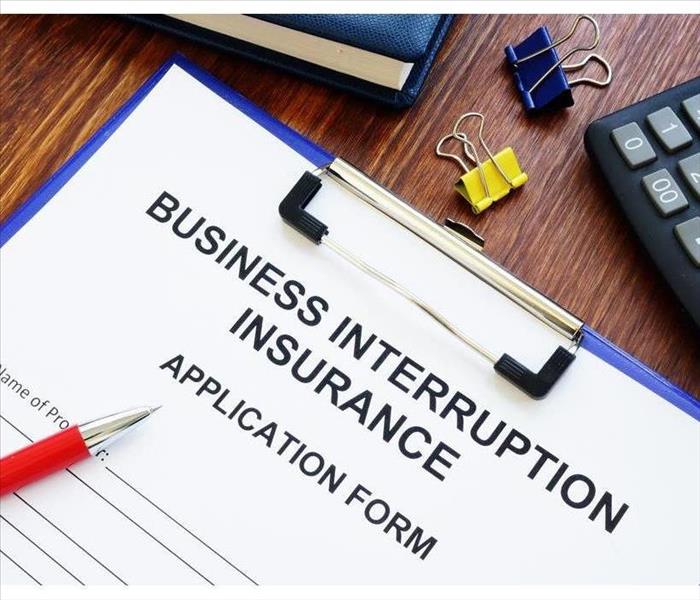 Business interruption insurance (BI) can help you recover lost income after a disaster.
Business interruption insurance (BI) can help you recover lost income after a disaster.
What Is the Function of Business Interruption Insurance?
Every business owner in Beaufort County has nightmares about their operations being interrupted by a disaster. The reality is that the likelihood of an interruption is far greater than most people would like to admit. Events such as fire, flood, and storm can not only damage or destroy your property but also disrupt your operations and cause millions in losses.
Business Interruption insurance provides coverage for lost income when you are unable to operate due to a covered event. For example, if you own a manufacturing plant in Florida which has suffered significant storm damage and cannot resume operations for 12 months; your business interruption insurance will cover the costs of renting space elsewhere while your building is being rebuilt or repaired.
What is business interruption insurance?
Business interruption insurance is a type of business insurance that helps cover the costs of your company if it’s forced to shut down because of a covered event. Business interruption insurance typically kicks in after a covered event occurs and continues for as long as necessary until your business can return to normal operations.
The coverage provided by business interruption insurance varies based on the terms and conditions outlined in each policy. Some policies may provide temporary buildings, salaries for management & employees, and other elements related to restarting operations once they have returned to normal levels.
What business interruption insurance covers
Business interruption insurance covers the costs of lost income and replacement business expenses that result from property damage, structural damage, or loss of inventory.
- Lost income: Business interruption insurance will pay for lost profits or revenue because of a covered property damage event. This kind of coverage might reimburse you for the cost of hiring temporary workers to replace those who have been injured or can no longer work due to the disaster. It may also cover business start-up costs associated with moving your operations to another location after your main facility has been damaged by an insured event.
- Replacement expenses: If your business suffers extensive damage from an insured event like fire or storm, this type of coverage can help cover the cost of repairing or replacing damaged property such as equipment, buildings (including inventory), and computer systems so that you're back up and running without having to worry about bills piling up while you're out of commission.
- Temporary relocation: If there's no way you can run operations at all while repairs are being made at your building—for example if portions of it have been destroyed in a natural disaster—temporary relocation expenses may be covered under this type instead if they're related directly back towards getting your company back up-and-running ASAP instead!
Why you need business interruption insurance
Business interruption insurance (BI) can help you recover lost income after a disaster. You never know when something unexpected might happen, and if you're unprepared, it could be devastating to your business. With BI, you'll have a plan in place to help protect your business from unexpected events—whether they're natural disasters or other catastrophes that cause damage or force the shutdown of your operations.
Businesses need to be prepared for the unexpected. It's important that you have enough coverage to pay for repairs and rebuilds in the event of a catastrophe so that your company doesn't lose money while waiting for funds from an insurance company or government agency like FEMA (Federal Emergency Management Agency).
Business interruption insurance is a valuable product that can help you recover from unexpected events. If you are interested in investing in business interruption insurance, reach out to your insurance company to learn more!
5 Things To Do When Your Toilet Floods
8/24/2022 (Permalink)
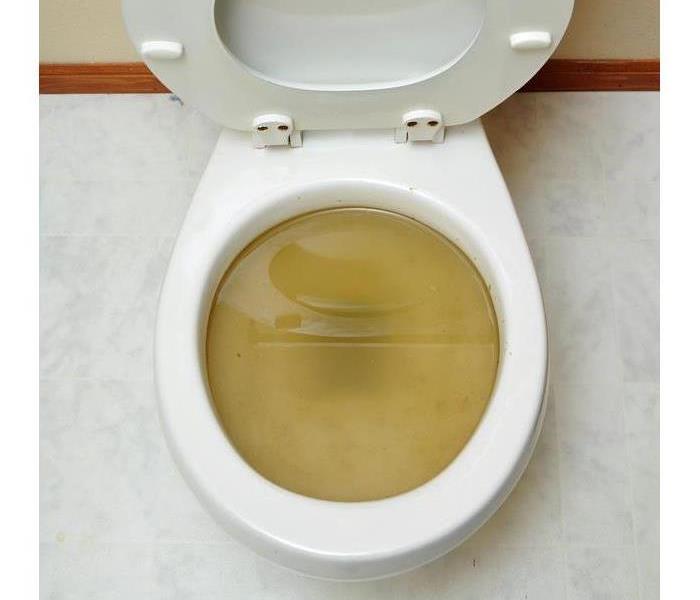 What to do when you have a flooded toilet in your company.
What to do when you have a flooded toilet in your company.
Five Steps to Take If Your Toilet Floods
In Hilton Head, SC, water damage in your business is a vast and costly hassle. Read below to find out what to do when you have a flooded toilet at your company.
1. Call a Professional
Since a toilet problem could be from sewer damage, it may be Category 2 or 3 water. A professional sewage company will assess the situation thoroughly.
2. Ensure Your Safety
Cutting off the electricity can keep you safe. Depending on the size of your property, it may be possible to isolate the shutdown to minimize the disruption to your workflow.
3. Shut Down the Source
If the toilet itself is clogged or malfunctioning, you can turn off the water at the toilet. Try shutting down the primary water source if you cannot get to the bathroom due to the flooding.
Unfortunately, as mentioned above, there may also be possible sewer damage, which means there may not be much you can do on your own.
4. Begin Removing Water
Again, keeping safety in mind, you may be able to get ahead by soaking up excess water using towels or other absorbent materials. However, if the leak occurred on an upper floor, it could be that the water has damaged the subfloor and ceiling below. If so, removing the flooring, ceiling tiles, and anything porous may be necessary before detailed drying can begin.
5. Dry Up the Place
Opening windows or using fans to create airflow is a good start. But, the pros will use industrial-sized dehumidifiers and air movers and check the progression using special sensors until they deem it dry.
When a water disaster disrupts your business in Hilton Head, SC, it is good to consider the possibility of sewer damage and call in the pros to help you get your business back up and running.
Keeping Your Building's Sprinklers in Top Condition
7/13/2022 (Permalink)
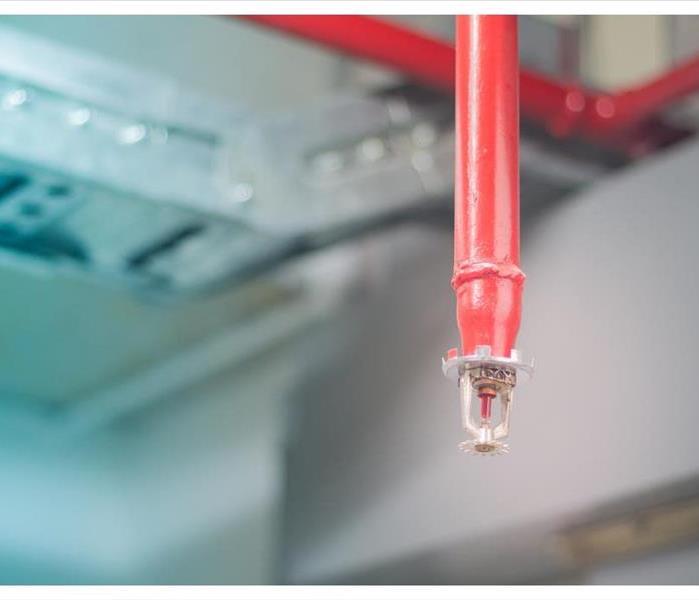 Maintain your fire sprinklers.
Maintain your fire sprinklers.
The Importance of Sprinkler Maintenance
As a building owner in Bluffton, SC, you understand the importance of sprinkler maintenance. Not only is it imperative that your sprinklers correctly switch on when needed but also that they only switch on when needed. The following are tips for keeping your system in top condition:
1. Maintain Your Fire Sprinklers
Sprinkler maintenance is the first step to reliable fire protection. All sprinklers should have a minimum of 18 inches of clearance below them. Once a year, a qualified contractor should inspect the system, including the heads, valves, fire pump (if applicable) and main drain. Every five years, a contractor should conclude an internal inspection, assessing pipes for buildup and debris.
2. Avoid Accidental Activation
Correctly maintaining the system can help avoid accidental activation caused by pipe corrosion or damaged components. However, there are other things to look for regarding sprinkler activation. Circumvent overheating heads by installing them away from stoves and skylights, for example. Vandalism can also be an issue in certain areas. Installing institutional sprinklers that are difficult to access helps dissuade vandals.
3. Educate Your Tenants
It's important that those living or working in the building understand their part in keeping sprinklers in working order and avoiding accidental activation. Inform tenants not to hang anything from heads, such as decorations or clothes hangers. Instruct them not to bump into the sprinklers (cages can be installed to avoid this) or tamper with them. If an issue arises, they should contact building maintenance rather than trying to repair the problem alone. In the event of sprinkler activation, it is always beneficial to contact a certified cleaning and restoration crew.
In the case of commercial fire, everyone hopes that their sprinkler system will perform correctly. In addition, it's essential that sprinklers not be activated unnecessarily, resulting in a hassle for tenants and financial strain for building owners. Sprinkler maintenance can go a long way in ensuring peace of mind for both possible situations.
4 Step Sewage Damage Cleanup Process
6/27/2022 (Permalink)
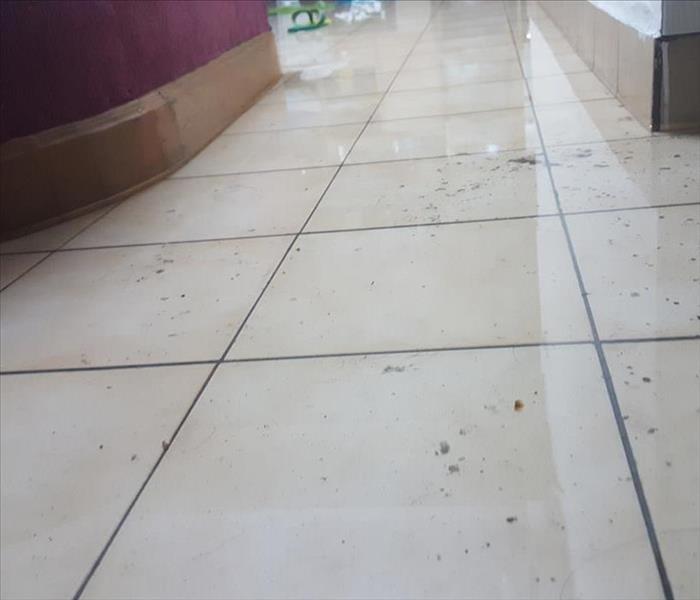 Sewer cleanup is not a fun process.
Sewer cleanup is not a fun process.
Four Steps of Sewage Damage Cleanup
Toilet overflows are fairly common in commercial buildings. The amount of foot traffic businesses see often means restrooms are overworked, at least when compared to residential bathrooms. Still, sewer cleanup is not a fun process, and many business owners might be unfamiliar with the rules of such maintenance tasks. Most water mitigation services in South Colleton County, SC, will suggest property owners hire a professional service, one that understands the four steps of sewage damage cleanup.
1. Begin the Sewer Cleanup
If the sewage damage is a result of a flooded toilet or backed-up drain, the most important step is to start. The faster you can remove sewage from a property, the less severe the damage. The initial cleanup process is similar to other floods. A company might use tools, such as pumps, to remove a majority of the contaminated water and waste. The important thing is to remove the sewage and keep it away from inventory and other elements.
2. Follow State and Local Regulations
Every territory may have different rules and regulations for how to handle a sewer backup. Most business owners are not aware of the specifics of such regulations. Therefore, instead of trying to cram a bunch of laws into your brain, consider hiring a professional service to take on the burden for you. Certified services already have the knowledge required to clean up your property, so let them.
3. Disinfect and Clean the Site
Once the sewage is removed from the facility, the service you hire will disinfect, sanitize, and clean every affected surface. The goal is to leave the property feeling as clean as it was before the disaster.
4. Restore the Property
Finally, the restoration company you bring on will work to repair the facility to "like-new" conditions. Most restoration companies want business owners to feel like a disaster never happened.
Sewer cleanup is not a fun process. You should not attempt a cleanup alone. A mitigation company or emergency plumbing service typically has the knowledge and tools necessary for the job.
4 Places Mold Might Be Hiding in Your Commercial Building
5/3/2022 (Permalink)
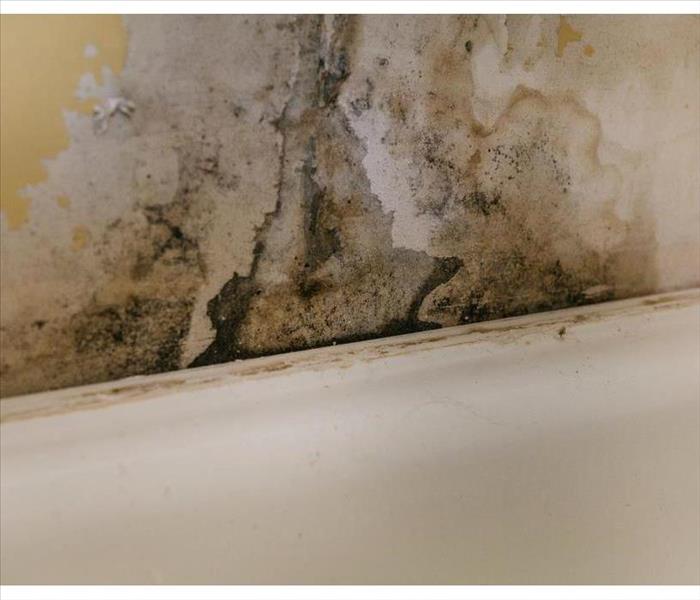 Mold growth on a wall due to humidity.
Mold growth on a wall due to humidity.
Why Do I Keep On Finding Mold?
There are a variety of reasons why you may be finding mold in your Burton, SC, building. Whether the cause is severe weather, plumbing issues, high humidity, or something else, this fungus will take advantage of the moisture. It can grow in nearly any location and may show up in places you might not think to look, including the following.
1. Behind the Walls
Water can sometimes find its way between the walls of your building. This may be the case if you have leaky plumbing or have experienced stormy weather. Mold growth inside walls may show up as discoloration in this area.
2. In HVAC Systems
If you have a heating and cooling system in your building, this can become a breeding ground for mold. Mold spores can gather inside these systems and create an infestation. The moisture present makes it a convenient location for growth.
3. Underneath the Carpet
Absorbent materials such as carpets hold onto moisture from spills or water damage, creating the conditions needed for mold to form. It can be difficult to locate mold in these areas, as it may be growing beneath the carpeting. One sign to be aware of is a persistent musty odor.
4. In the Plumbing
Another place that mold growth can turn up is in the plumbing. Because of the water involved, plumbing fixtures such as toilets, sinks and showers can grow mold if they are not regularly cleaned. Keeping these surfaces dry after use can help prevent this.
When mold forms in hidden spaces such as these, it can be difficult to determine when you have an infestation. If you notice unpleasant odors in the building, mold growth may be the culprit. It can be helpful to have a mold remediation specialist come in to perform an inspection if you are unsure. Reducing moisture levels can help prevent mold and keep it from returning.




 24/7 Emergency Service
24/7 Emergency Service




